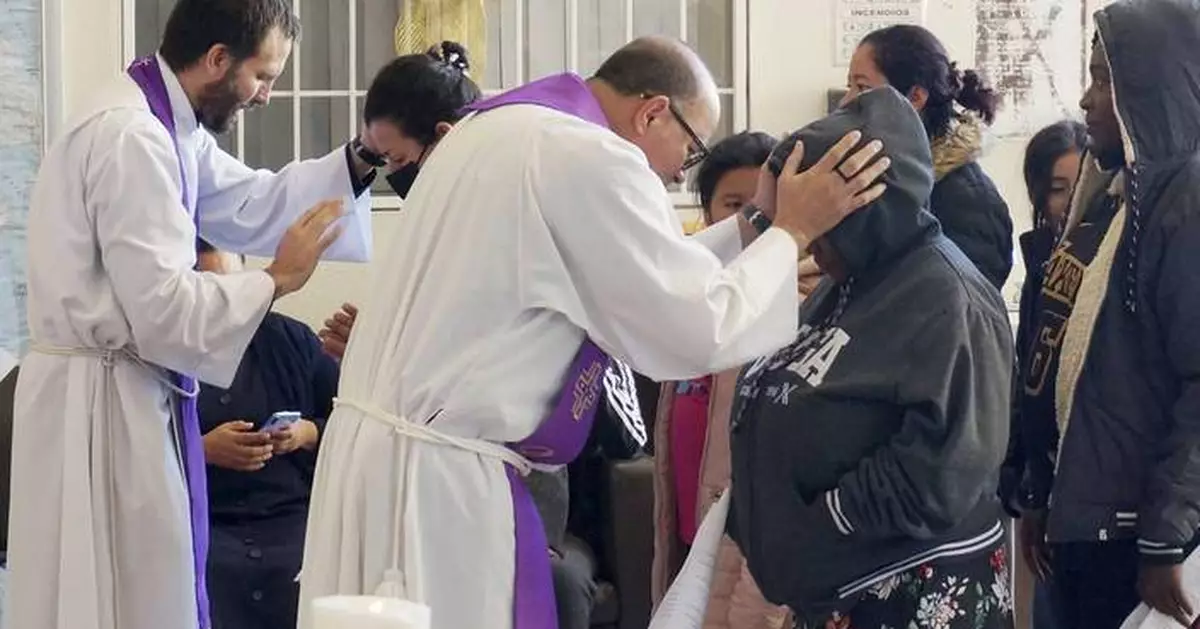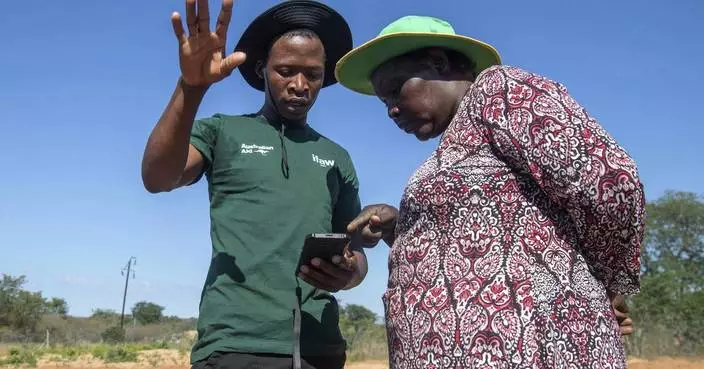Pope Francis was the first pontiff elected from the Society of Jesus — also known as the Jesuits.
It’s one of the most prominent religious orders in the Catholic Church, with approximately 15,000 priests, brothers and novices from more than 110 countries.
Click to Gallery
FILE - Migrants try to stay warm while camping outside the Sacred Heart Church in El Paso, Texas, on Sunday, Dec. 18, 2022. . (AP Photo/Andres Leighton, File)
FILE - Rev. Jesus Reyes administers a baptism in the atrium of the Saint Francis Xavier Parish church in Cerocahui, Mexico, Sunday, May 12, 2024. (AP Photo/Eduardo Verdugo, File)
FILE - In this photo taken on Tuesday, May 9, 2023, migrants wake up at the campsite outside Sacred Heart Church in downtown El Paso, Texas. (AP Photo/Andres Leighton, File)
FILE - Indigenous women attend a support group during an event organized by the Jesuit Migrant Network that provides support to the relatives of migrants who died trying to reach the U.S. in Comitancillo, Guatemala, Monday, March 18, 2024. (AP Photo/Moises Castillo, File)
FILE - The Rev. Brian Strassburger, left, and the Rev. Flavio Bravo, right, bless migrants during Mass at the Casa del Migrant shelter in Reynosa, Mexico, on Dec. 15, 2022. (AP Photo/Giovanna Dell'Orto, File)
Their reach extends from prestigious universities in world capitals to humble migrant shelters in sweltering jungle hamlets, all in pursuit of the mission encapsulated in their motto — "ad majorem Dei gloriam" ("for the greater glory of God").
“As if answering an implicit question about who a Jesuit is, Pope Francis … affirmed that ‘the Jesuit is a servant of the joy of the Gospel’ in whatever mission he is engaging,” the order’s superior general, the Rev. Arturo Sosa, wrote in his message to fellow Jesuits upon Francis’ death.
Here are some essential facts about the Jesuits.
The order was founded in the 16th century by Spanish St. Ignatius of Loyola, whose “Spiritual Exercises” are still a classic of Catholic contemplative practices. From the beginning, he emphasized the missionary, international reach of the order.
Over the subsequent centuries, the Jesuits have built a reputation in scholarship and education, founding schools and universities around the globe, including Georgetown University in Washington and the Pontifical Gregorian University, which serves mostly clergy, nuns and seminarians in Rome.
Far from the halls of academia, the Jesuits have also often led frontline efforts to help those on the margins, ministering at many border flashpoints in the Americas and to refugees from conflict and humanitarian crises worldwide.
That ability to move from socio-political elites to the most marginalized has been a hallmark of the Jesuits from their founding, said the Rev. Bruce Morrill, a Jesuit priest and theology professor at Vanderbilt University in Tennessee.
“God is glorified where human beings are saved,” Morrill said, summarizing the thread between the Jesuits’ educational, spiritual, social justice and humanitarian missions.
Jesuit Refugee Service was founded in 1980 to respond to the growing needs of those escaping the aftermath of the Vietnam War.
Since then, it has become one of the most active organizations globally in helping refugees, asylum seekers and migrants around the world, regardless of their faith. Advocating for migrants was one of Francis’ top priorities.
There are also Jesuit Migrant Network and Jesuit Migrant Service groups active in many countries, providing humanitarian, legal, psycho-social and pastoral care to those displaced by violence or hunger.
They also minister to the families migrants leave behind. Nearly two dozen migrants left from the area around a small town in Guatemala’s largely Indigenous highlands, only to die en route in Mexico and the United States in recent mass tragedies. The parents and siblings of the dead said the Jesuits were the only constant support.
The Rev. Michael Gallagher, a Jesuit priest and attorney, ministered to 13,000 migrants last year in El Paso, Texas, where his church used to operate a shelter a few blocks north of the U.S.-Mexico border. It is now closed, due to the enormous drop in border crossings.
“We all felt greatly supported by his keeping saying that migrants are important,” Gallagher said of Francis. “His continued focus on the humanity and human dignity of all people, especially those often demonized, is one of his lasting contributions.”
Also in Texas, the Rev. Brian Strassburger, another Jesuit priest, directs Del Camino Border Ministries in the Rio Grande Valley and has often visited nearby shelters in Mexico. He called Francis a “great pastor and pilgrim” who put “the defense of migrants at the center of his papacy” from the beginning through his final Easter message.
“He constantly reminded us that we are all migrants on a journey in this life, and our final destination is eternal rest with the Lord,” Strassburger said.
At one point in history the Jesuits were refugees of sorts themselves — Pope Clement XIV, bowing to pressure from European political interests in 1773, ordered the society to be disbanded. In 1814, a different pope restored the Jesuits, who got right back into their educational vocation.
Just two years ago, Nicaragua’s government confiscated the Jesuit-run University of Central America, which had been a hub of massive protests against President Daniel Ortega. His crackdown on religious freedom has been widely condemned.
During El Salvador’s civil war, the church tried to mediate peace between the government and those rising against it when, in 1989, soldiers killed six Jesuits on the campus of the Central American University in the country’s capital.
Many communities in Mexico are still grieving the 2022 murder of two elderly Jesuit priests in the remote Tarahumara mountains by a leader of one of Mexico’s crime gangs.
The Jesuits have also been targets of controversy, from abuses in former residential schools for Indigenous children in Canada and the United States affiliated with the order to a recent case involving a famous ex-Jesuit artist.
The order announced last month reparations to some 20 women who said they were sexually, psychologically and spiritually abused by the Rev. Marko Rupnik, who was expelled by the Jesuits in 2023.
Associated Press religion coverage receives support through the AP’s collaboration with The Conversation US, with funding from Lilly Endowment Inc. The AP is solely responsible for this content.
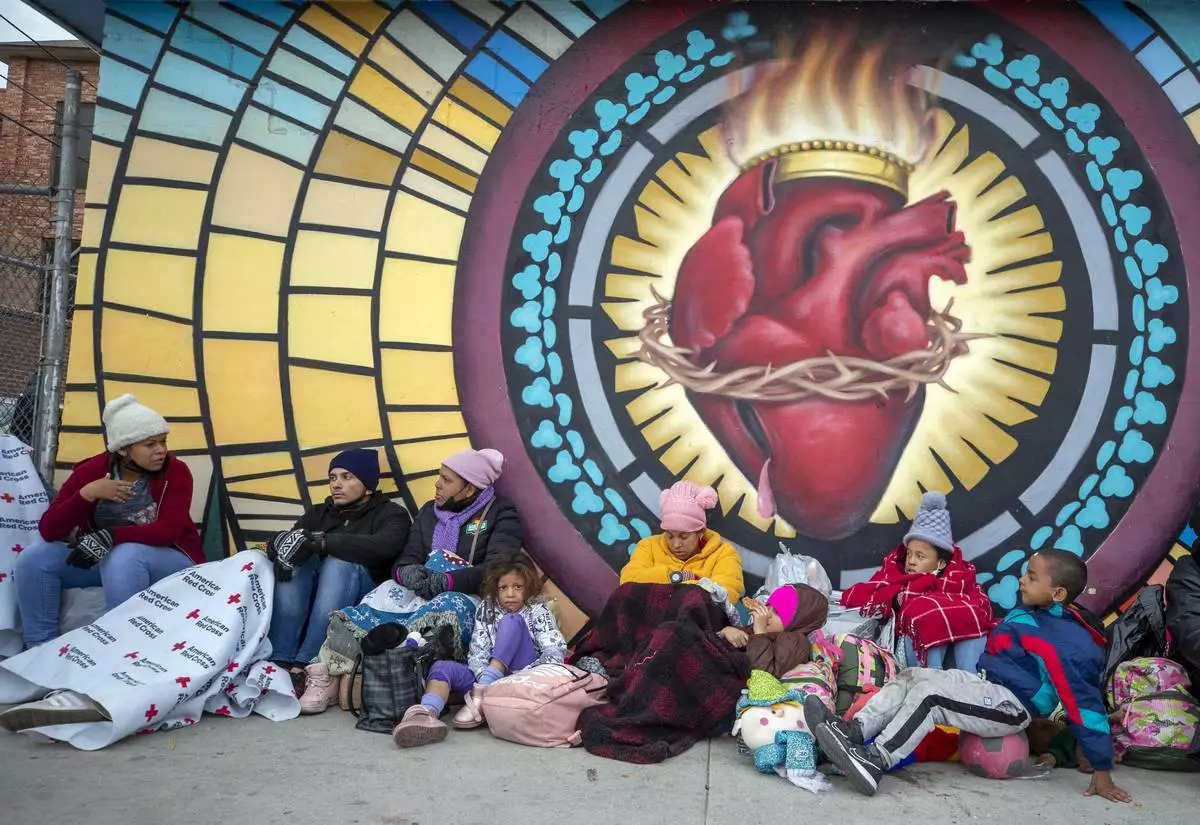
FILE - Migrants try to stay warm while camping outside the Sacred Heart Church in El Paso, Texas, on Sunday, Dec. 18, 2022. . (AP Photo/Andres Leighton, File)
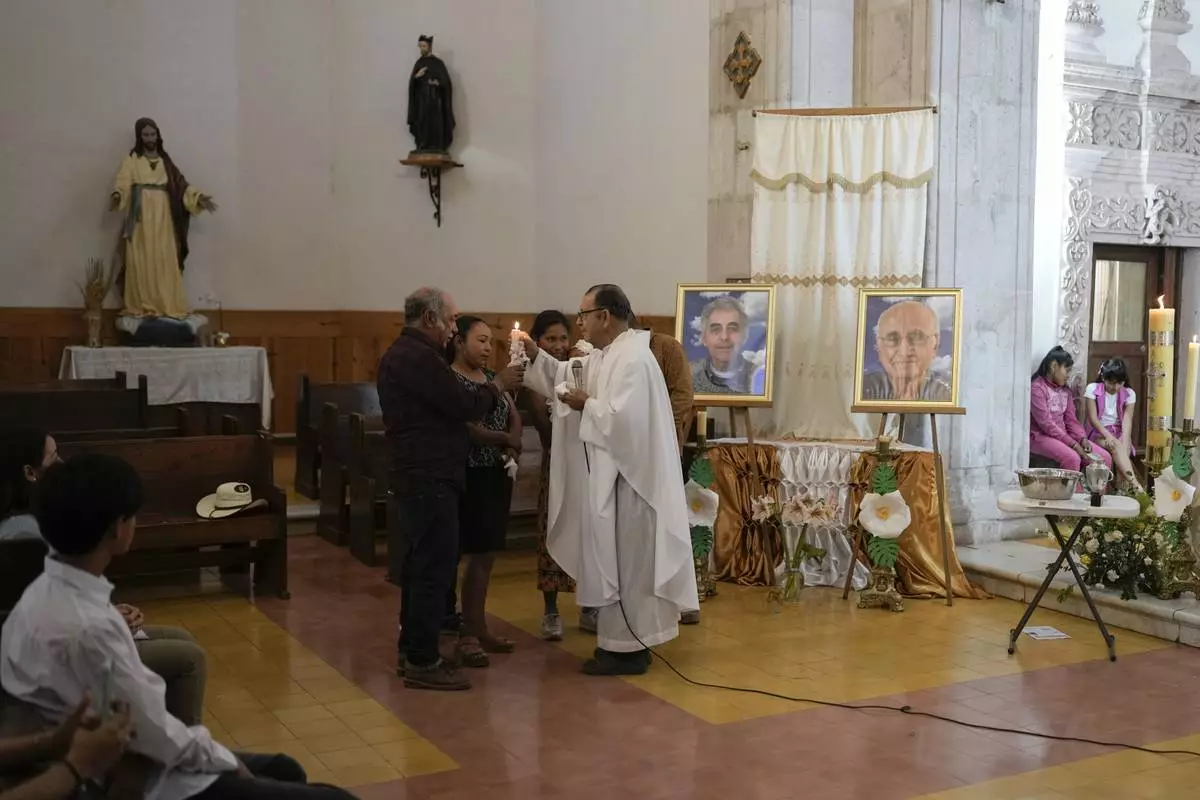
FILE - Rev. Jesus Reyes administers a baptism in the atrium of the Saint Francis Xavier Parish church in Cerocahui, Mexico, Sunday, May 12, 2024. (AP Photo/Eduardo Verdugo, File)
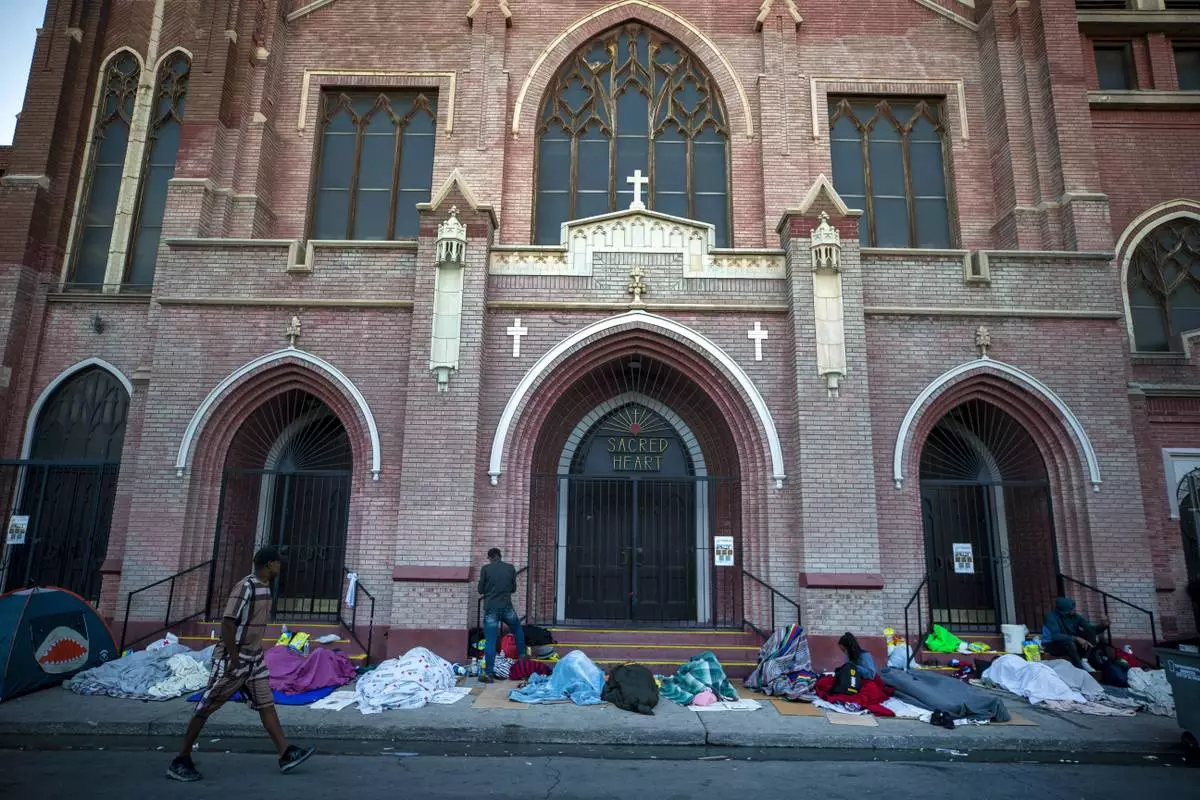
FILE - In this photo taken on Tuesday, May 9, 2023, migrants wake up at the campsite outside Sacred Heart Church in downtown El Paso, Texas. (AP Photo/Andres Leighton, File)
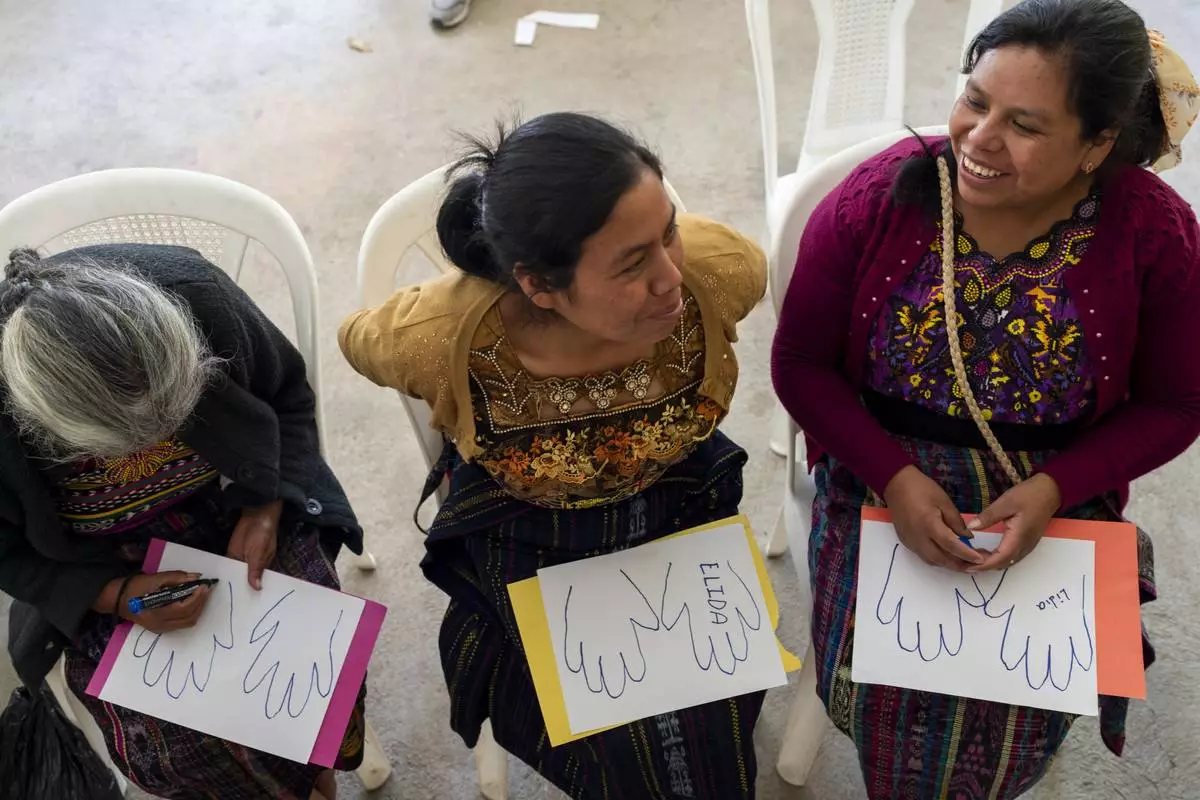
FILE - Indigenous women attend a support group during an event organized by the Jesuit Migrant Network that provides support to the relatives of migrants who died trying to reach the U.S. in Comitancillo, Guatemala, Monday, March 18, 2024. (AP Photo/Moises Castillo, File)
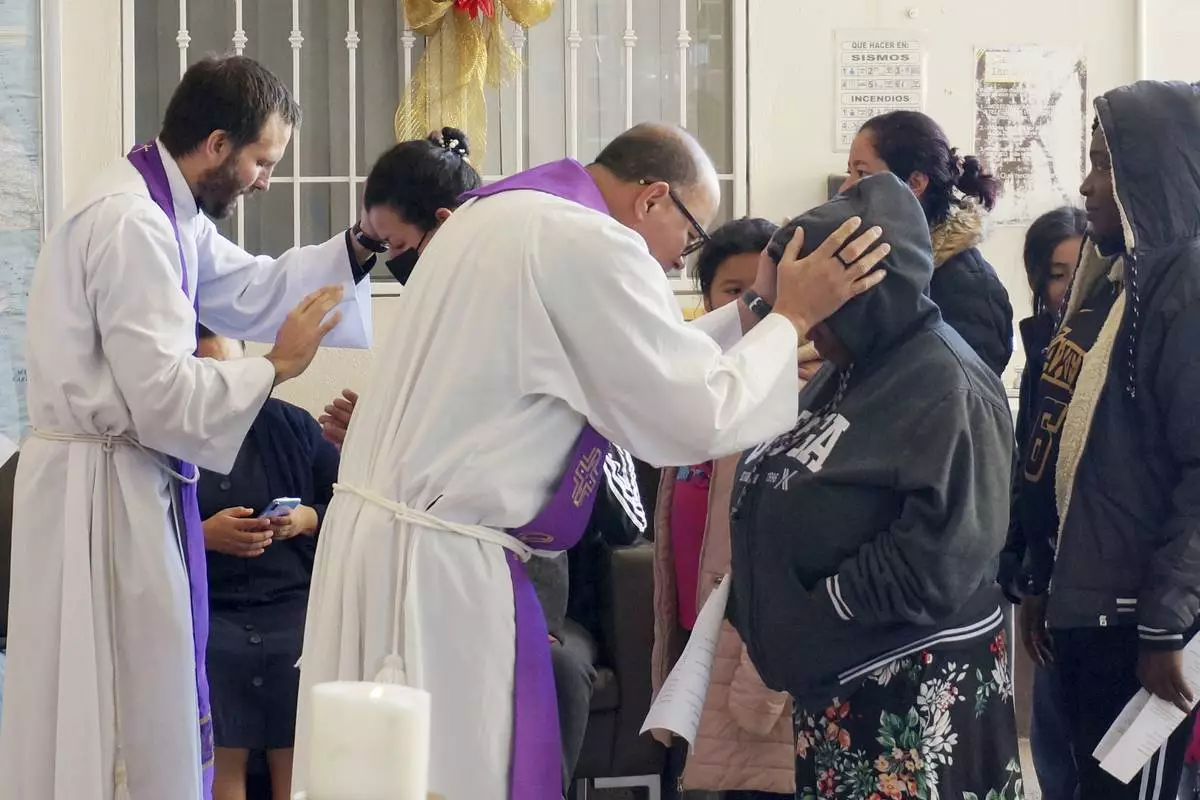
FILE - The Rev. Brian Strassburger, left, and the Rev. Flavio Bravo, right, bless migrants during Mass at the Casa del Migrant shelter in Reynosa, Mexico, on Dec. 15, 2022. (AP Photo/Giovanna Dell'Orto, File)
ATLANTA (AP) — A pregnant woman in Georgia who was declared brain dead after a medical emergency has been on life support for three months to let the fetus grow enough to be delivered, a move her family says a hospital told them was required under the state's strict anti-abortion law.
With her due date still more than three months away, it could be one of the longest such pregnancies. Her family is upset that Georgia’s law that restricts abortion once cardiac activity is detected doesn’t allow relatives to have a say in whether a pregnant woman is kept on life support.
Georgia’s so-called “heartbeat law” is among the restrictive abortion statutes that have been put in place in many conservative states since the Supreme Court overturned Roe v. Wade three years ago.
Adriana Smith, a 30-year-old mother and nurse, was declared brain-dead — meaning she is legally dead — in February, her mother, April Newkirk, told Atlanta TV station WXIA.
Newkirk said her daughter had intense headaches more than three months ago and went to Atlanta's Northside Hospital, where she received medication and was released. The next morning, her boyfriend woke to her gasping for air and called 911. Emory University Hospital determined she had blood clots in her brain and she was declared brain-dead.
Newkirk said Smith is now 21 weeks pregnant. Removing breathing tubes and other life-saving devices would likely kill the fetus.
Northside did not respond to a request for comment Thursday. Emory Healthcare said it could not comment on an individual case because of privacy rules, but released a statement saying it “uses consensus from clinical experts, medical literature, and legal guidance to support our providers as they make individualized treatment recommendations in compliance with Georgia’s abortion laws and all other applicable laws. Our top priorities continue to be the safety and wellbeing of the patients we serve.”
Smith's family says Emory doctors have told them they are not allowed to stop or remove the devices that are keeping her breathing because state law bans abortion after cardiac activity can be detected — generally around six weeks into pregnancy.
The law was adopted in 2019 but not enforced until after Roe v. Wade was overturned in the 2022 Dobbs v. Jackson Women’s Health Organization ruling, opening the door to state abortion bans. Twelve states are enforcing bans on abortion at all stages of pregnancy and three others have bans like Georgia's that kick in after about six weeks.
Like the others, Georgia's ban includes an exception if an abortion is necessary to maintain the woman's life. Those exceptions have been at the heart of legal and political questions, including a major Texas Supreme Court ruling last year that found the ban there applies even when there are major pregnancy complications.
Smith's family, including her five-year-old son, still visit her in the hospital.
Newkirk told WXIA that doctors told the family that the fetus has fluid on the brain and that they're concerned about his health.
“She’s pregnant with my grandson. But he may be blind, may not be able to walk, may not survive once he’s born,” Newkirk said. She has not said whether the family wants Smith removed from life support.
Monica Simpson, executive director of SisterSong, the lead plaintiff in a lawsuit challenging Georgia’s abortion law, said the situation is problematic.
"Her family deserved the right to have decision-making power about her medical decisions,” Simpson said in a statement. “Instead, they have endured over 90 days of retraumatization, expensive medical costs, and the cruelty of being unable to resolve and move toward healing.”
Thaddeus Pope, a bioethicist and lawyer at Mitchell Hamline School of Law in St. Paul, Minnesota, said while a few states have laws that specifically limit removing treatment from a pregnant woman who is alive but incapacitated, or brain dead, Georgia isn't one of them.
“Removing the woman's mechanical ventilation or other support would not constitute an abortion,” he said. “Continued treatment is not legally required.”
Lois Shepherd, a bioethicist and law professor at the University of Virginia, also said she does not believe life support is legally required in this case.
But she said whether a state could insist Smith remains on life support is uncertain since the overturning of Roe, which found that fetuses do not have the rights of people.
“Pre-Dobbs, a fetus didn’t have any rights,” Shepherd said. “And the state’s interest in fetal life could not be so strong as to overcome other important rights, but now we don’t know.”
The situation echoes a case in Texas more than a decade ago when a brain-dead woman was kept on life support for about two months because she was pregnant. A judge eventually ruled that the hospital was misapplying state law, and life support was removed.
Brain death in pregnancy is rare. Even rarer still are cases in which doctors aim to prolong the pregnancy after a woman is declared brain-dead.
“It’s a very complex situation, obviously, not only ethically but also medically,” said Dr. Vincenzo Berghella, director of maternal fetal medicine at Thomas Jefferson University in Philadelphia.
A 2021 review that Berghella co-authored scoured medical literature going back decades for cases in which doctors declared a woman brain-dead and aimed to prolong her pregnancy. It found 35.
Of those, 27 resulted in a live birth, the majority either immediately declared healthy or with normal follow-up tests. But Berghella also cautioned that the Georgia case was much more difficult because the pregnancy was less far along when the woman was declared brain dead. In the 35 cases he studied, doctors were able to prolong the pregnancy by an average of just seven weeks before complications forced them to intervene.
“It’ s just hard to keep the mother out of infection, out of cardiac failure,” he said.
Berghella also found a case from Germany that resulted in a live birth when the woman was declared brain dead at nine weeks of pregnancy — about as far along as Smith was when she died.
Georgia's law confers personhood on a fetus. Those who favor personhood say fertilized eggs, embryos and fetuses should be considered people with the same rights as those already born.
Georgia state Sen. Ed Setzler, a Republican who sponsored the 2019 law, said he supported Emory’s interpretation.
“I think it is completely appropriate that the hospital do what they can to save the life of the child,” Setzler said. “I think this is an unusual circumstance, but I think it highlights the value of innocent human life. I think the hospital is acting appropriately.”
Setzler said he believes it is sometimes acceptable to remove life support from someone who is brain dead, but that the law is “an appropriate check” because the mother is pregnant. He said Smith's relatives have “good choices,” including keeping the child or offering it for adoption.
Georgia’s abortion ban has been in the spotlight before.
Last year, ProPublica reported that two Georgia women died after they did not get proper medical treatment for complications from taking abortion pills. The stories of Amber Thurman and Candi Miller entered into the presidential race, with Democrat Kamala Harris saying the deaths were the result of the abortion bans that went into effect in Georgia and elsewhere after Dobbs.
Mulvihill reported from Cherry Hill, New Jersey. Associated Press journalists Lisa Baumann, Kate Brumback, Sudhin Thanawala, Sharon Johnson and Charlotte Kramon contributed.

Emory University Hospital Midtown is seen on Thursday, May 15, 2025, in Atlanta. (AP Photo/Brynn Anderson)
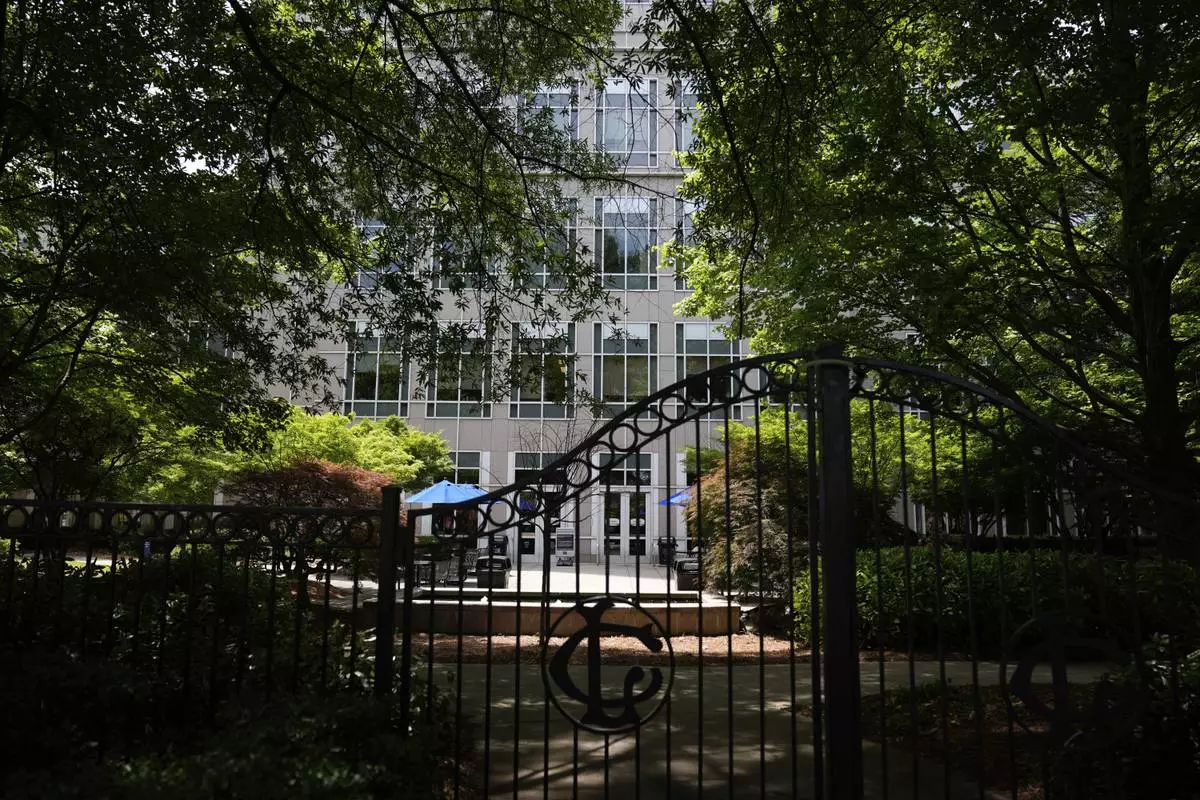
Emory University Hospital Midtown is seen on Thursday, May 15, 2025, in Atlanta. (AP Photo/Brynn Anderson)

Emory University Hospital Midtown is seen on Thursday, May 15, 2025, in Atlanta. (AP Photo/Brynn Anderson)

Emory University Hospital Midtown is seen on Thursday, May 15, 2025, in Atlanta. (AP Photo/Brynn Anderson)

FILE - The Georgia State Capitol is seen from Liberty Plaza in downtown Atlanta, April 6, 2020. (Alyssa Pointer/Atlanta Journal-Constitution via AP, File)







